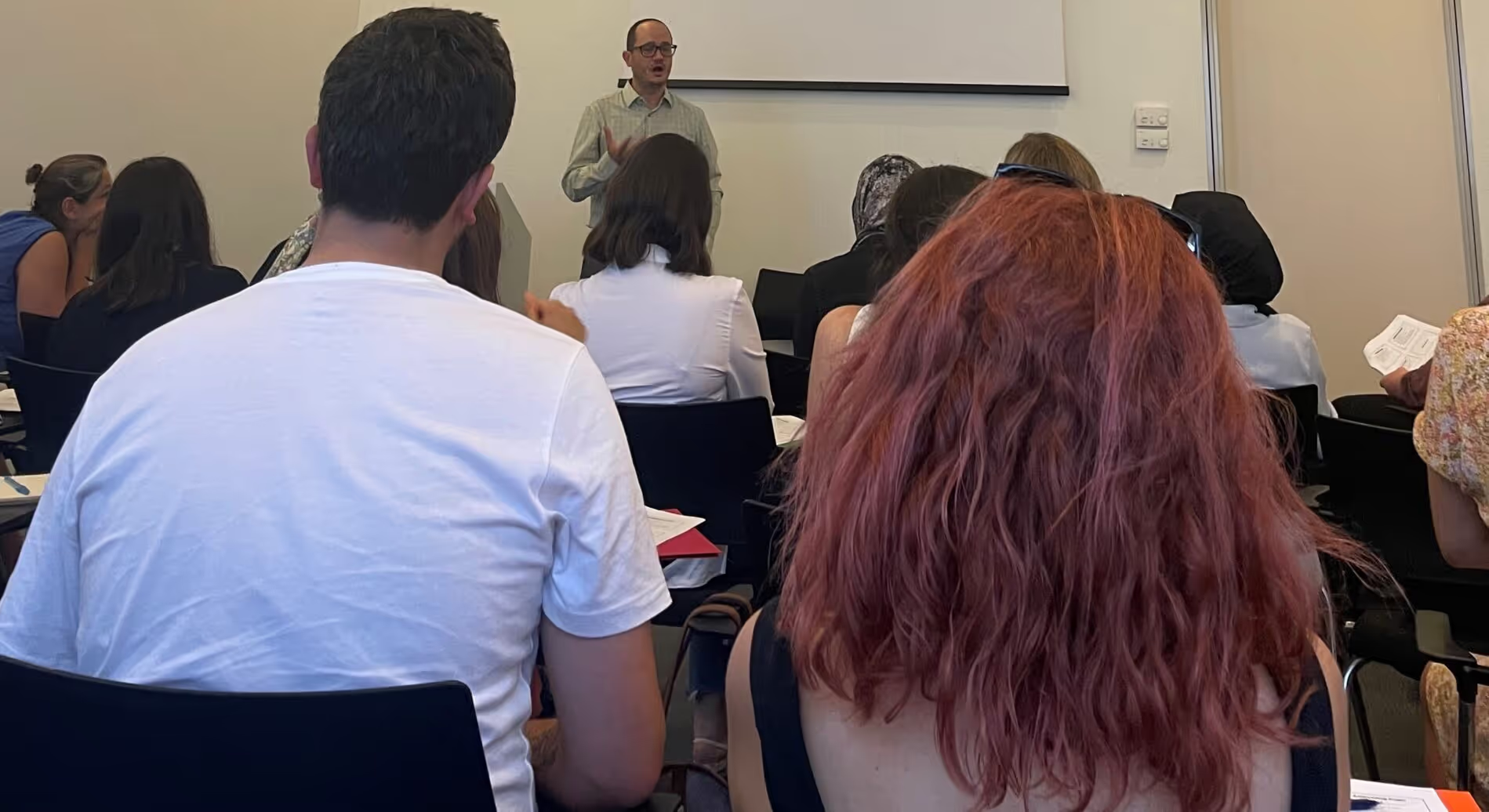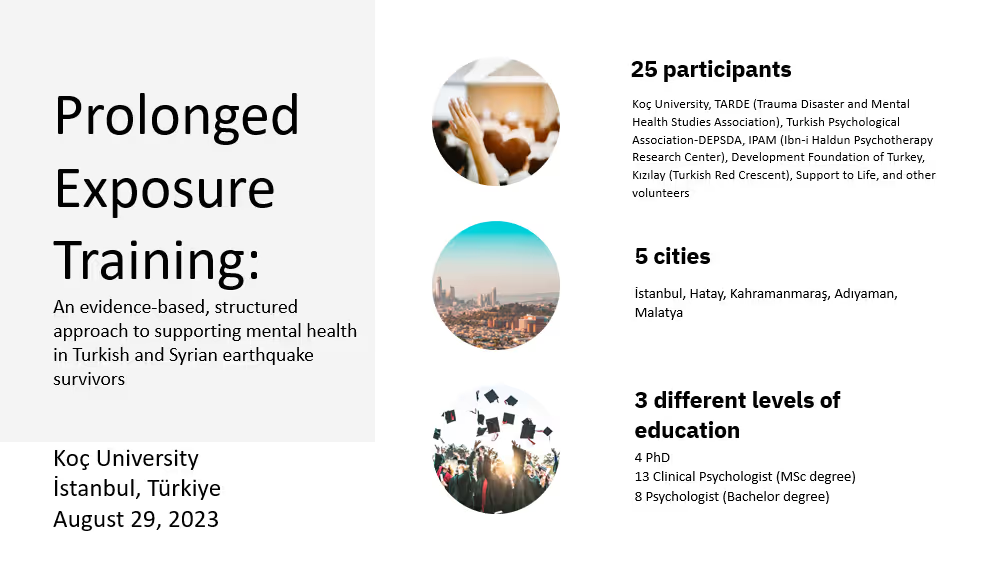Supporting earthquake survivors in Türkiye: training local clinicians in prolonged exposure therapy

By Shivani Pandey, Norah Feeny, Jacob Bentley and Lori Zoellner
“The earthquake didn’t just damage buildings.”
– Asude Uçal, Psychologist, Koç University
The earthquakes in Türkiye and Syria, which struck in February 2023, have left behind immense psychological stressors for survivors. They are still working through the aftermath, having experienced threats to both life and livelihood. Exposure to traumatic events – such as experiencing the earthquakes, sustaining physical injuries, seeing casualties, losing loved ones and family members, and losing their homes due to damage – have left behind mental health challenges as survivors strive to find stability. Approximately three million people have been displaced by the earthquakes and many continue to live in temporary camps. As Asude continues, “[Many] basic needs are not being met.”
We met Asude when she participated in a one-day training in Istanbul, facilitated by our team of clinicians from the University of Washington and Case Western Reserve University. When we heard the tragic news of the earthquakes, it was important to us that we try to use our collective skills and resources to contribute to a capacity-building effort for the mental health response. We have been working with Muslim communities for the last ten years developing a faith-based, lay-led, trauma-focused intervention called Islamic Trauma Healing to promote mental health and community reconciliation. Coming alongside mental health providers is a logical extension of this work funded by Elrha's R2HC program.
The training in Istanbul was for over 25 clinicians working in the earthquake-affected region and focused on prolonged exposure (PE) therapy. PE is a first-line, empirically-supported psychotherapy that addresses posttraumatic stress, related symptoms, and functioning after trauma exposure. When we initially discussed the possibility of hosting a training with Associate Professor Dr. Ceren Acartürk and her team at Koç University, Dr. Acartürk emphasized the long-term nature of the trauma, saying that its effects often seem “never ending.” Together we discussed the how to best support mental health workers in the field and decided that a training and long-term consultation in PE would provide a sustainable, easily-implemented intervention for earthquake survivors.

The training
Psychologists with different levels of training (ranging from bachelor’s to PhDs), all practitioners with NGOs actively engaged in the earthquake response (eg, Turkish Red Crescent, UNICEF, Support to Life) traveled to İstanbul, from cities such as Hatay, Kahramanmaraş, Adiyaman, and Malatya. Each clinician participating in the training brought with them their own wealth of experiences, knowledge, and understanding of the impact of the earthquakes on mental health. The training included lectures and discussion about trauma, PTSD, and PE coupled with roleplays and small group practice in specific intervention components – for example, revisiting the trauma memory and discussion of common reactions to trauma.
Clinicians provided insights into the needs of frontline mental health practitioners and the communities they serve and positive feedback on the workshop. Asude noted that, PE “can …help [people] get back to a place where they feel a bit more control in their life… that sense of agency, that sense of control, is very damaged...Their own plans for the future, their own self-conceptions, conceptions about other people, have all changed.” She continued, “The best thing in this workshop is that it gives structure, and it gives a frame on how we should proceed.” Another clinician noted that PE provides patients with, “...time and space to express their feelings and process their thinking [after the earthquake].” Ekin Çakır, a psychologist from Koç University, summed up her experience, "[as] mental health specialists [we] gained a great tool to respond to this increased need in the earthquake-affected areas.” Dr. Zeynep Seker, a clinical psychologist, added how “useful [PE is] when you’re working with trauma.” Finally, Dr. Acartürk highlighted, “I think fieldworkers/ trauma workers are helping each other so it's good that you came here and provided this prolonged exposure training.”
What comes next?
Türkiye sits at important crossroads as a link between the West and the Muslim world, with a developed mental health system yet also profound need with the recent earthquakes and continuing Syrian refugee crisis. This training was the first step in our team’s engagement with those working in the field in Türkiye. We will continue monthly implementation consultations with these clinicians. This is a part of our overall commitment to seeing the implementation of evidence-based approaches to mitigating posttraumatic distress in humanitarian settings through sustained international partnerships. In the future, we anticipate expanding this work to include trainings and consultation, specifically for Muslim populations, using Islamic Trauma Healing in crisis-affected areas around the world.
[.slimline-cta-box][.slimline-cta_heading]Find out more[.slimline-cta_heading][.slimline-cta_paragraph]Read more about the project by visiting the Islamic Trauma Healing profile page.[.slimline-cta_paragraph][.slimline-cta-box]
Stay updated
Sign up for our newsletter to receive regular updates on resources, news, and insights like this. Don’t miss out on important information that can help you stay informed and engaged.
Explore Elrha
Learn more about our mission, the organisations we support, and the resources we provide to drive research and innovation in humanitarian response.